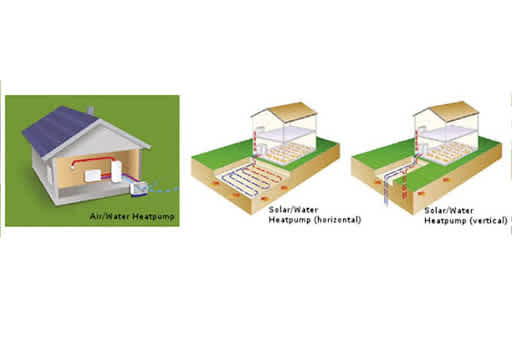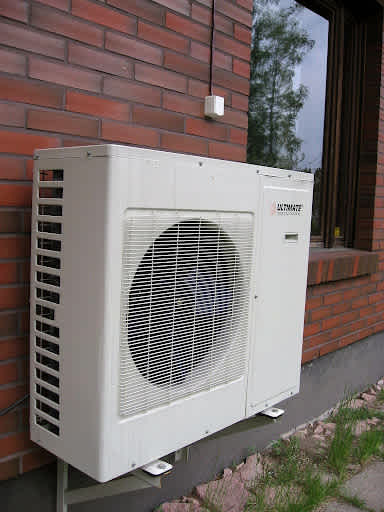INTRODUCTION
A heat pump is a device that uses a small amount of energy to move inside of the house. To put it simply, it is a system that needs to be installed inside the house. It takes the heat from the surroundings and increases the inside temperature of a house. It usually deals with thermal energy which is common in houses. With the help of thermal energy, heat pumps transfer the heat/energy between the spaces inside the house. Because of a closed space of a house, heat can't go outside of the house. A heat pump acts as an air conditioner. Just as air conditioners provide the cooling inside the house, heat pumps act like providing the heat energy inside a house.
HEAT PUMP: OVERVIEW
Heat pumps are usually good for the winter seasons because, in winter, a heat pump pulls the heat energy from the outside surface and then transfers it into the house. They are capable of providing heat in the winter seasons. Just as air conditioners which are capable of providing the cold air in the summer seasons. Heat pumps work on electricity. They use the refrigerant to transfer the heat inside the house. It is the best way to provide comfort inside the house, especially in the winter seasons. The main thing about heat pumps is that they can handle both cooling and heating. And that is why people in their houses don't need to install air conditioners in the summer season and heaters (specifically to provide the heat) in the winter seasons. With the help of one system, one can feel both the temperatures in two different seasons. Heat pumps do not burn fossil fuels, they work with eco-friendly methods.
OBJECTIVES OF HEAT PUMP
Pulls the energy
Can work on both cooling and heating
Transfer the heat energy
Also known as space conditioning
Take electricity
The process runs in the reverse direction
Uses a thermal reservoir
Absorbs the heat from the cold place
Releasing the cold air in a warmer place
Higher efficiency
Works with other heating systems
Takes a lot of energy
Takes a lot of time
Direct heating
Sustainable environment
Works with eco-friendly methods
Assist in strong development
TYPES OF HEAT PUMPS
There are two types of heat pumps that are very common these days. Everyone in their house at least has one of these two heat pumps.
1. AIR - SOURCE
A very famous heat exchanger process. In this, heat pumps transfer the heat from the outside to the inside of a house. A very popular type of heat pump is widely used in residential areas. The reason behind using the air - source of heat pumps in residential areas is because in urban areas, in some states, there is a difference in temperature between day and night. so for that reason, these types of heat pumps are used there.
2. GROUND - SOURCE

ground-source
In this type of heat pump, heat is transferred inside of a home from the ground surface from outside. A minor difference between the two is that in the air - source heat is transferred from outside to inside of a house from the air surroundings and in-ground - source, heat is transferred from outside to inside from the ground surface. It is an expensive method to install inside of a house but these pumps are far more reliable than air-source heat pumps.
COMPONENTS OF A HEAT PUMP SYSTEM
A coil
A condenser
A fan
Refrigerant
Compressor
Reversing valve
Expansion valve
Evaporation mode
HOW DOES THE HEAT PUMP WORK

how-heat-pump
Firstly, heat pumps do not have a power or a system that can create heat automatically. They use the redistribution power to do the same. They require a refrigerant that takes the heat from either air - source or ground - source and circulates that heat with the help of a fan. The process is done with the help of a compressor that is fitted outside of a system and transfers the heat.
About the cooling part, a heat pump works exactly the opposite of heat pumps used in the winter seasons. In this method, a heat pump takes the heat (which is present inside of a house) and releases it to it outside of a house. And after that, the heat pump absorbs the heat from outside either from the air - source or ground - source and releases it inside of a house. A Very famous method which is used by the heat pumps to transfer the heat in the winter season and cold wind in the summer seasons.
HOW MUCH DO HEAT PUMPS COST
The amount of heat pumps largely depends on the requirement of an individual
First, one needs to decide which type of heat pumps they need to install
The basic criteria to decide are based on the needs, requirements, requirements, location, budget, for how much time, temperature, etc.
An average budget for which one needs to install the heat pumps is between $1,500 to $10,000.
One of the major criteria to know more about the budget is the size of the pump.
The cost which will be incurred to one is also the labor costs.
One cannot install the whole heat pump by themselves, because it is not possible to do the same. But if one has an idea of how to install the heat pump, they can save the labor costs
The environmental factor is also one of the major issues in deciding the budget. For example, climate, conditions, the shape of a home, labor costs, how much time one will take to install the heat pumps, transportation costs, and maintenance costs & repair costs.
So, the average cost that one can incur is around $5,700 depending on every possible cost to be included.
The amount can increase if one decides to go for the brand items.
The excess amount of electricity is one of the criteria for an increase in budget.
Adding the cost of burning oil or gasses, can increase the budget
But a very good advantage of installing a heat pump is that it can be used to install heat pumps, one does not need to install the air conditioners in the summer season and heater in the winter season individually.
For example, if one needs to install the heat pumps in New England, it will cost him/her is between $2,300 to $5,500
PRINCIPLES OF HEAT PUMP

principles-heat-pump
There are two types of heat pumps that are used today. One of them is air-to-air HP and another one is geothermal HP.
Air-to-air HP uses the outdoor air for the process while Geothermal HP uses ground (can be water or earth surface) to transfer the heat energy.
The air-to-air type of heat pump is more reliable than the other and is more popular, especially in residential areas.
In a Geothermal type of heat pump, they use the ground energy to transfer the heat energy. With the help of ground energy, the heat is transferred more economically and also it allows for better performance.
An important piece of equipment that is used in to do the process of transferring is the transfer coil that keeps a low temperature with the surrounding.
The HP is the most necessary component of a process used for the vapor compression technique. It is done with the help of a refrigeration machine.
flow-control
From the picture above, we can say that the transfer process takes the help of both the condenser and evaporative to reverse the temperature. Condenser helps with the outside of a house while evaporation works with the temperature inside the house. With the help of flow control, the transfer of heat will happen.
ADVANTAGES OF THE HEAT PUMP
Reduces the carbon emissions
Long life
Low maintenance costs
Ensures the better safety
Provides cooling
Two in one system
For sustainable environment
Works on eco-friendly methods
Eligible for RHI Scheme
Based upon combustion
Cheaper than other options
Efficient systems
The conversion rate is higher
DISADVANTAGES OF THE HEAT PUMP
A high upfront cost is there
The size of a pump can be a problem
Labor costs
Transportation costs
Not suitable for each type of homes
They are more expensive
Electricity usage must have been an increase
Consumption of energy
The electricity invoice will be double
It is an undersized unit system
Must have been in a poorly insulated space
Unnecessary usage of heat
A dirty system to transfer the heats
CONCLUSION
We can conclude this by saying that there have been more advantages of heat pumps than disadvantages. Just like every coin has positive and negative consequences. But in the end, an individual has to decide whether they want to go for that or not. Heat pumps may use air and water resources for energy but in opposition to using the resources, they provide comfort to the individuals while in their homes. It is a system and it is made up to lessen the concerns of individuals while feeling the heat in winters and cold in summers.
